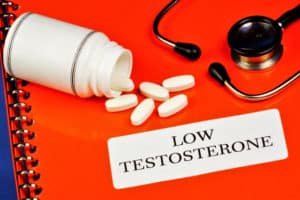Wondering about Low T?
 Testosterone. It is the quintessential male hormone, even though every man also has estrogen and other hormones coursing through his blood. Testosterone, though; it’s powerful. It is capable of facilitating muscle growth more easily and is a vital aspect of sexual wellness. Men who have an abundance of energy to complete daily tasks and still do normal “guy” things, including relatively frequent sexual intercourse, have testosterone to thank for their virility and vibrancy. At some point, many men encounter issues in these areas. They encounter the dreaded low T, or low testosterone levels. Here, we discuss some of the frequently asked questions about low testosterone.
Testosterone. It is the quintessential male hormone, even though every man also has estrogen and other hormones coursing through his blood. Testosterone, though; it’s powerful. It is capable of facilitating muscle growth more easily and is a vital aspect of sexual wellness. Men who have an abundance of energy to complete daily tasks and still do normal “guy” things, including relatively frequent sexual intercourse, have testosterone to thank for their virility and vibrancy. At some point, many men encounter issues in these areas. They encounter the dreaded low T, or low testosterone levels. Here, we discuss some of the frequently asked questions about low testosterone.
An Intro to Low T
It is understood in the medical community that most men will experience a gradual decline in testosterone as they age. During the teen years, testosterone production is robust. By mid-adulthood, levels have regulated to a degree at which a man is more capable of managing his aggression and sexuality. By middle age, levels may begin to decline at a relatively rapid pace and to such a degree that symptoms begin to develop.
What constitutes low testosterone?
Low testosterone is generally defined as a significant or sudden drop in this hormone. But what does that look like? Clinically speaking, testosterone levels may vary from 300 to 1000 ng/dL. Laboratory results from bloodwork that measure less than 300 ng/dL usually indicate low testosterone. Well before lab work confirms this, patients typically have some idea that their energy and vitality are not what they’d like. Men may experience a variety of symptoms as a result of lower testosterone levels. Erectile dysfunction may be the most well-known. In fact, some men may use that as the one and only marker. But there are others.
Symptoms of low testosterone include:
- Decreased sex drive
- Low semen volume
- Decreased testicle size
- Hair loss
- Increased body fat
- Loss of muscle mass
- Decreased bone mass
- Mood changes
- Memory problems such as difficulty recalling events
- Fatigue
Why Do Men Develop Low T?
Age is by far the most significant factor in low testosterone levels. Additional factors that can contribute to this condition include the use of opioids or certain antidepressants, obesity, and metabolic conditions like high blood pressure.
Low testosterone may be a condition that affects men of a certain age, but that doesn’t make it normal. Your Chattanooga urologist can perform testing to measure your testosterone levels and, if needed, address this condition with optimization treatment designed around your physical needs. To schedule a consultation at UT Urology, contact us at (423) 778-5910.

 The value of optimal testosterone levels is an aspect of men’s health with which we have become more familiar over time. It has been known for some time that testosterone is what makes a man “manly.” Testosterone promotes the muscle and hair growth that characterizes masculinity. This androgen is also relevant to erectile function and other important facets of a man’s health. As more has been learned about testosterone, and about the issue of
The value of optimal testosterone levels is an aspect of men’s health with which we have become more familiar over time. It has been known for some time that testosterone is what makes a man “manly.” Testosterone promotes the muscle and hair growth that characterizes masculinity. This androgen is also relevant to erectile function and other important facets of a man’s health. As more has been learned about testosterone, and about the issue of 